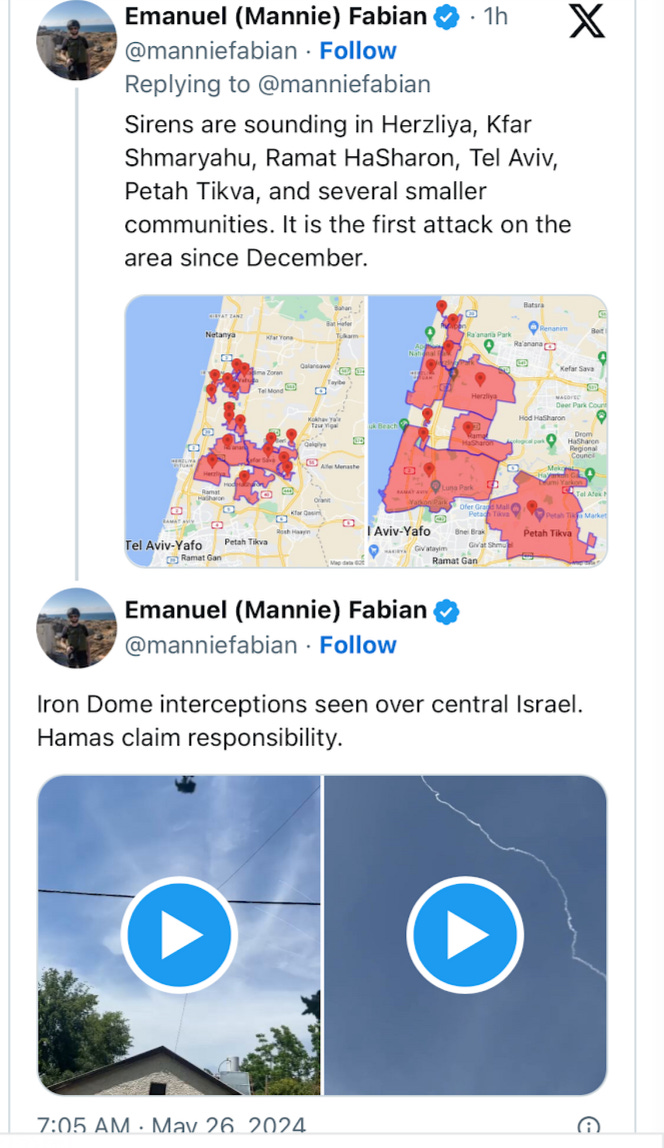Memorial Day & D-Day(s); Jews, Money and Boesky
Money matters to Jews, but it's not what you think. Plus, as the 80th anniversary approaches of democracy's most fateful moment, our own generation's D-Day is just 164 days away
In This Moment
For those just joining the “In This Moment” family, welcome aboard! This (approximately) weekly newsletter, complete with main essay, random reflections and other recommended stuff, is an offshoot of my long-running Shabbat-O-Gram. I hope you’ll read and recommend my musings. For those who don’t know me, or may have fleeting recollections of my 25 years of Jewish Week columns and other writings, you can check out my bio to see what I’ve been up to, and take a look at my recent Substack piece called “Flipping the Script” to get an idea where I am headed. Please let your friends and family know about this newsletter and encourage them to subscribe. For now everything is free, though paid subscriber incentives will soon be available.
Morality, Money and Boesky
This past week marked the death of one of the most notorious Jewish villains of the 20th century. No, not Meyer Lansky. Not Meir Kahane. But Ivan Boesky, the Wall Street cheater who was imprisoned for federal securities violations in 1987, one of the most notorious insider trading scandals ever. His name became synonymous with shame in Jewish philanthropic circles and with greed in the movies. When I was studying at the Jewish Theological Seminary, a state-of-the-art new library was built, and it was called the Boesky library. I went back to visit one day and the name was gone.
The Talmud states that "The first question an individual is asked at the final judgment is: 'Were you honest in your business dealings?'" (Shabbat 31a)
In the Torah, business ethics are a big deal. My colleague Jeffrey Salkin points out that there are 24 laws in the Torah that are about traditional Jewish dietary practice. But there are more than 100 commandments in the Torah that address economic issues. That’s just another reason why all those jokes about Jews and money are so offensive (as I pointed out last week in my discussion of the Tom Brady Roast)
This past Shabbat’s Torah portion of Behar is a veritable treasure trove of business ethics standards. Here are three examples:
1) Deal honestly, do not cheat: Leviticus 25:14. And if thou sell aught unto thy neighbor, or buyest aught of thy neighbor’s hand, ye shall not wrong one another.
2) Help people in business. Give interest-free loans: Leviticus 25:36. Take thou no interest from him, or increase: But fear thy God; that thy kin may live with thee.
3) Treat workers fairly and kindly: Leviticus 25:43. Thou shalt not rule over them with rigor; but shalt fear thy God.
We need role models not like Boesky but like this guy: The great early 20th century Jewish moralist Rabbi Israel Meir Kagan, known as the Chafetz Chayim (“the one who seeks life”), was famous for being scrupulously honest in his business dealings. He made it a habit not only to be ethical in his treatment of others, but to routinely go above and beyond the letter of the law. For example, it is said that he and his wife invested in a grocery store to earn some extra money, and one time a woman who had purchased a herring left it in the store. He couldn’t recall who that person was, so for the next few days, the Chafetz Chayim gave free herring to everyone who came into the store (who in turn gifted him a lifetime supply of Febreze). On another occasion, he insisted that his son distribute numerous free replacement copies of a book when he discovered that several pages of the original printing had been inserted in the wrong order.
He was once asked, by a disciple just before Passover, what supervisors of female matzah bakers should be most fastidious about in making sure that the product is prepared according to the strictest standards of Jewish law. “Make sure,” he replied, “that the women are paid on time.”
On another occasion, he scampered through the streets of Warsaw just before the Sabbath in order to compensate printers who had left work early, before the paychecks had been handed out. The Chafetz Chayim remains a beloved figure to this day, and a perfect exemplar of the rabbinic assertion that "Whoever conducts business honestly is universally admired and it is considered as though he observed the entire Torah." (Mechilta, Exodus 15:26).
There are more than 100 commandments in the Torah that address economic issues. That’s just another reason why all those jokes about Jews and money are so offensive.
Honesty in the public arena has been a central component of Jewish thought and practice since biblical times. The Hebrew words for “work” and “worship” are the same, and my premise is that they are identical, and if anything, the Bible is more concerned about the former than the latter. The second word of the Bible is “bara” “created.” In the beginning, before there was anything else, before there were stars or oceans or human beings, there was work – honest, ennobling work, productive and revitalizing for employer and employee alike.
The history of religion is the history of people who have sought salvation through their business dealings. Abraham humbly struck a deal with the Hittite Ephron for Sarah’s burial place. Jacob, both the deceiver and deceived in his transactions, learned the hard way how to toil with integrity. The prophets spoke of an age of blissful peace, and for them such an age would include meaningful, joyous work, with swords transformed into ploughshares and spears into pruning hooks.
Early Christian heroes were carpenters and fishermen and their monks chanted “labore est orare,” “Work is praying.” The Moslem world knows of no distinction between work and religion; many of its rules of the marketplace are drawn directly from the Quran and its commentaries.
“Great is work,” says the Talmud, “for it exalts the person who does it.”
The Hebrew words for “work” and “worship” are the same, and my premise is that they are identical, and if anything, the Bible is more concerned with the former than the latter. The second word of the Bible is “bara” “created.” In the beginning, before there was anything else, before there were stars or oceans or human beings, there was work – honest, ennobling, creative work, productive and revitalizing for employer and employee alike.
There was a time when honesty in business was understood to make good financial sense, to be “the best policy,” in Ben Franklin’s words. That could well have been true for Franklin’s Philadelphia, which prospered while being guided at the time by Quaker principles of truth, simplicity and integrity. But more often, the Almighty and the almighty dollar have been strange bedfellows. For a piece of paper that states “In God We Trust,” few endeavors have lured people further from both God and trust as the pursuit of the dollar. The Spanish writer Federico Garcia Lorca perceived that in the early 20th century, when he wrote:
The terrible, cold, cruel part is Wall Street. Rivers of gold flow there from all over the earth, and death comes with it. There, as nowhere else, you feel a total absence of the spirit.
Ever since the days of Joseph in Egypt, the business world has known dramatic fiscal cycles – years of plenty followed by years of famine. But while fortunes have routinely been won and lost during these spectacular swings, the degree of greed propelling it all seems to have been set on a permanently upward trajectory. Financial scandals have become a fixed component of our civilization. In 2002, Forbes created a Corporate Scandal Sheet tracking major corporate accounting scandals of the prior year. They listed 22, including Halliburton, Enron, K-Mart and Merck. But those were the “good old days,” quaint in comparison to what was to come, an innocent age when most people would have thought a Ponzi scheme was something hatched up by Henry Winkler on “Happy Days.”
But then in 2008, we were walloped by an ethical Katrina – or more accurately, Sodom and Gomorrah, because the cascade of outrageous revelations seemed biblical in scale. Shearson begat Siemens, which begat Morgan Stanley, which begat the auto companies’ mismanagement and AIG’s post bailout spa retreat.
And towering above all was Bernard Madoff’s magnum opus, called by British investor Nicola Horlick "the biggest financial scandal, probably in the history of the markets."
Madoff perpetrated the mother of all Ponzi schemes, for which I proposed his excommunication from the Jewish people, but in his wake more Ponzis were uncovered, and the rogue’s gallery grew to include such schemers as Allan Stanford, Barry Tannenbaum, Scott Rothstein and let’s not forget Brian Jared Smart, who targeted the elderly with his Ponzi. The list of the investigated, indicted and convicted since Madoff is long and tawdry, a Who’s Who of corruption, and the collateral damage has been almost incalculable. But these scandals have yet to produce the moral sea change one might have expected in their wake. Washington has punted on serious reform, which is to be expected, but religious organizations have also been strangely apathetic - and that is blasphemous. At a time when honorable voices have most been needed to be heard, few have risen above the din of talk show accusations and Capitol Hill grandstanding.
We need strong moral voices, but we need something else even more. The yawning gap between the pulpit and the trading floor needs to be bridged. America thrives on a separation of church and state, but it falls if there is a wall erected between the words “business” and “ethics.”
I learned early on of the similarities between work and worship and how the academic pursuits of the ancient Jewish sages were not at all that different from the transactions of Wall Street execs. If religious and business leaders understood that they are speaking essentially the same language, each striving to tap into a pervasive sense of manifest destiny, a prevailing optimism that our work is God’s work and that God’s world can be perfected through that work, maybe that gap could be closed, and maybe the Almighty and the almighty dollar could join forces at last.
The elaborate scaffolding of intertwined case studies and moral maxims constructed by the rabbis does not forbid us from building towers of financial achievement; it simply helps us to build them better. It doesn’t prohibit the accumulation of wealth, but rather the worship of excessive wealth. It reminds us that the real capital being earned and spent by companies is not cash but confidence, and the most important trust fund is the depository of good faith that grows only when stakeholders, stockholders and employees can trust how their money is being invested. It doesn’t matter whether the prime goal is the accumulation of money or the repair of God’s world: the greatest strategy for long term growth is the ethical path.
On page after page, traditional sources are filled with wisdom that people in the business world need to hear – and to heed – in order to curtail the sins of excess. “Who is rich?” the Talmud asks, “The person who is content with his lot.” Paul states in 1 Corinthians, “I planted, Apollos watered, but God gave the growth.” And the Bhagavad Gita states, “"Hell has three gates: lust, anger, and greed."
When Bernie Madoff was captured, there was a narrow window of opportunity, a moment when religious, political and business leaders could have come together to transform the culture. That moment has passed, and now we’re faced with the worst possible scenario, a landscape of public mistrust and cynicism for a workplace that has yet to be reformed. This is bad for everyone, but for Madoff’s coreligionists it is even worse. Like it or not, Bernie Madoff has become the poster boy for Jewish business ethics, when in fact that poster boy should be the Chafetz Chayim. And people are making Jews and money jokes at Netflix comedy roasts. We’re back in the morass.
The yawning gap between the pulpit and the trading floor needs to be bridged. America thrives on a separation of church and state, but it falls if there is a wall erected between the words “business” and “ethics.”
Traditional sources can guide us in dealing with practical issues that have always had an impact on public life, questions of price fixing, insider trading, copyright infringement, child labor, whistle blowing, bribery, invasions of privacy, product liability and more. We need to cultivate organizations like the Interfaith Center for Corporate Responsibility, where wallet and conscience can intersect.
A partnership between business and religious leaders can help us to find an ethical light at the end of this dark tunnel.
Maybe it’s not too late. Maybe the moral compass can be recalibrated. Maybe it can even be improved. Maybe a new partnership can be forged between the worlds of business and religion – the best of both worlds, for both have so much of value to share. Maybe, together, we can forge a world where work and worship might meet and become one.
Random Musings….
Thoughts on Lag B’Omer, Memorial Day and Two D-Days
Sunday marks the 33rd day of the Omer counting. Each day of the Omer is characterized by a different combination of kabbalistic attributes. Lag B’Omer is Hod sh’b’hod, the glory of glory, reflecting our appreciation of God’s greatness and glory. See below an excerpt from Siddur Lev Shalem’s explanation of this glory-filled fifth week:
Having a day that is doubly glorious, and, given that hod also connotes gratitude (think of the Hebrew word for “thank you,” todah), Lag B’Omer distinctly reminds us not to take the glorious gifts provided to us, especially life and liberty. It therefore fits in perfectly with Memorial Day weekend.
And over the coming days, we will also commemorate the 80th anniversary of D- Day. A while back, while I was making one of my road trips to Massachusetts to visit my special-needs brother, I transported myself back in time by listening to long segments of the radio broadcasts of D-Day. You can find 24 consecutive hours of real-time coverage on YouTube.
I highly recommend listening to this broadcast in a controlled setting like a car, where you can shut out other electronic distractions and imagine being back on that day in 1944, waiting for news over endless hours, with no social media, no cell phones, no satellite or drone surveillance, nothing but our imagination and our fears. The fact that the first word of the landing came from Berlin Radio only adds to the uncertainty, as the ships struggled to find their targets on the Normandy coast amidst a literal fog of war. Nothing at all could be assured, and everything was hanging on the success of this mission. Even the Nazis were flummoxed beyond beyond propaganda. They were too confounded by the moment even to lie. It was days, weeks, months, before the success of D-Day became manifest. And no day was more important, and no victory was ever so essential for the survival of democracy as that one was.
Until now.
The next several months of 2024 are our June 1944.
D-Day will, for America and for the world, last for the next 164 days, the amount of time until Election Day. Back in 1944, had thousands of brave soldiers not scaled the forbidding cliffs of Normandy, under relentless enemy fire, our bold experiment in democracy would have failed. The same could well be true now.
Yes, as we commemorate the 80th anniversary of D-Day, this is democracy’s D-Year. Listen to the recording. Imagine the excruciating uncertainty. Imagine the fear of a world under the fascist grip. And between the hot dogs and apple pie, say a prayer on this Memorial Day - a prayer for all of us.
They had to wade into enemy fire. They were sitting ducks, yet they moved forward, stepping on the bodies of fallen comrades.
ALL WE HAVE TO DO IS TAKE THIS MOMENT SERIOUSLY AND NOT DOWNPLAY IT, NOT UNDERESTIMATE THE DAMAGE A SECOND TRUMP ADMINISTRATION COULD DO, just because we were lucky enough to have survived the first one.
We do not have to scale Nazi fortifications. We just have to scale our own inertia. We don’t have to dodge bullets, we just need to evade the conspiracy theories, the lies, the demonization, the tactics of divide and conquer that are being aimed especially at Jews right now.
On this Memorial Day and this Lag B’Omer, let’s say a prayer for freedom, love and democratic values. Let’s say a prayer for our world.
Recommended Reading & Viewing
Re. the antisemitic trope of Jews and money, see Andrew Silow-Carrol’s piece, Exhausted by the Israel discourse? Blame backlash fatigue. (JTA) He writes, “I’d mostly forgotten about Ivan Boesky when I heard he died Monday at age 87. But news of his death brought me back to some of my earliest assignments as a Jewish journalist — and how they relate to this week’s controversial Washington Post story about a group of Jewish machers seeking to influence the debate over Israel.”
While our thoughts are focused on Memorial Day, read what might have been the most momentous rabbinic eulogy ever, given by Rabbi Roland Gittelsohn on Iwo Jima. An excerpt:
Thus do we consecrate ourselves, the living, to carry on the struggle they began. Too much blood has gone into this soil for us to let it lie barren. Too much pain and heartache have fertilized the earth on which we stand. We here solemnly swear: this shall not be in vain. Out of this, and from the suffering and sorrow of those who mourn this, will come—we promise—the birth of a new freedom for all humanity everywhere.
UN’s top court orders Israel to ‘immediately’ halt its operation in Rafah (CNN)
Next week will be Pride Shabbat at my congregation, my final one in Stamford. It has always been very special for me, in part because a number of my family members are LGBTQ, including my cousin Jeff Avick, who died of AIDS in 1999. Six years before his death, he spoke from my pulpit about living with HIV. It was one of the most life-affirming talks I’ve ever heard. For the first time, I am sharing the entire speech with the general public. You can read it here. I’ll talk more about it next week.
TBE’s Shari Goodstein recommends I the Nova Exhibition at 35 Wall Street. “It is an extraordinary re-creation of the festival, before, during and after the atrocities. (you can Google Nova Exhibition to buy tickets). In a nutshell, in a limited yet very impactful way, it provides some of the facts and perspective that are provided during a mission to post October 7th Israel, as well as the ability to show gratitude to a few Israelis who were at the festival. It’s only here until mid-June.
Screams Before Silence. Shari adds that Sheryl Sandberg’s recently released documentary “is also very important for young adults and adults to see, in order to understand and hopefully feel more empowered to condemn the horrific sexual violence against girls, women and men on October 7 (and everywhere), and likely continuing against the hostages now. Sandberg’s message: rape is never ok, regardless of political views. Rape is never resistance”.
Inside the NBA Was Good for Jews (Forward). But is Kyrie Irving?
Netanyahu Must Choose: Endless War in Gaza or Biden's Remarkable Deal (Ha'aretz) - The Biden administration has presented Netanyahu a plan that could potentially defeat Hamas and cinch Saudi normalization with Israel. But Washington is growing impatient with the prime minister's inaction which threatens to undermine America's credibility in the region – and Israel's very future
Netanyahu will ‘soon’ address joint session of US Congress, House speaker announces (TOI)
(Here’s my take) Is this actually going to happen? Aside from October 7 and Judicial Reform and, OK, so many other things, Netanyahu’s rogue and partisan manipulations of American politics have been his biggest strategic error.
Supporting Romney outwardly in 2012.
His romance with every GOP presidential candidate since.
His disastrous visit to Congress in 2015.
Is he going to do that again? Are the Israeli people going to allow him to do that - AGAIN? To go to DC behind the back of a sitting president who has done more for Israel in her time of need than any prior president, in order to interject himself squarely into an American political season. It is the ultimate act of chutzpah.
Meet Jill Hausman, the real rabbi who grimaced through jokes about Jews on SNL’s ‘Weekend Update’ (JTA) - “I was glad the jokes weren’t worse than they were,” Hausman said on Monday. “I didn’t know what was going to be said specifically until I got to the studio and then I kind of knew. So I just was hoping that they wouldn’t say anything really, really against Israel, which they didn’t.”
Think about that for a second. Most of America’s prime comedy shows - Daily Show, John Oliver, SNL - are now expected to be harsh on Israel. It’s become the norm, which is not normal. What’s the prime cause? Discuss…
Herzog: Saudi normalization would be a victory, should be seriously considered (TOI)
See also: The U.S. assembles the pieces of a possible Gaza war endgame (WaPo) - Key points:
The beginning of an end to the war would be a cease-fire and hostage-release deal, which the Biden administration has been seeking for months. Here, too, there has been some progress. U.S. officials believe talks could resume as soon as this week, even though (or perhaps because) Israel plans a Rafah assault. The elements of an agreement that would bring an eventual end to the war are there — on paper. Because Netanyahu’s right-wing coalition balks at many of the details, the final dealmaking might fall to a future Israeli government. But you can see, in the distance, the contours of a possible exit ramp.
Israel defense officials have agreed on a strategy for “the day after” that will include a Palestinian security force drawn in part from the Palestinian Authority’s administrative payroll in Gaza. This Palestinian force will be overseen by a governing council of Palestinian notables, backed by moderate Arab states such as Egypt, Jordan, the United Arab Emirates and Saudi Arabia. Some Israeli officials — but not Prime Minister Benjamin Netanyahu — accept that this governing entity would have ties with the PA in Ramallah. An important new wrinkle is that Hamas negotiators have told Egypt that they might accept this Gaza governing entity as part of the “transitional arrangement” outlined in the latest draft of a U.S.-negotiated agreement on a cease-fire and release of hostages, according to a knowledgeable official.
Saudi Arabia has agreed to a “near final” draft of a security agreement with the United States that would include normalization of relations with Israel. A summary of Sullivan’s talks on Sunday with Crown Prince Mohammed bin Salman said that, as part of this deal, the kingdom expected agreement on a “credible pathway” toward a two-state solution to the Palestinian problem, a softening of previous Saudi language. The Saudi role would be crucial to any final resolution of the Gaza conflict.
Finding our "inner Jew" (Jewish Journal) - We are warriors against those who wish us harm, we are transmitters of light, and we never apologize for being proud members of an ancient tribe.
Sunday’s front pages: Jerusalem Post, Ha’aretz, Yediot Achronot
From the “X”Files
From this morning (via Times of Israel)











